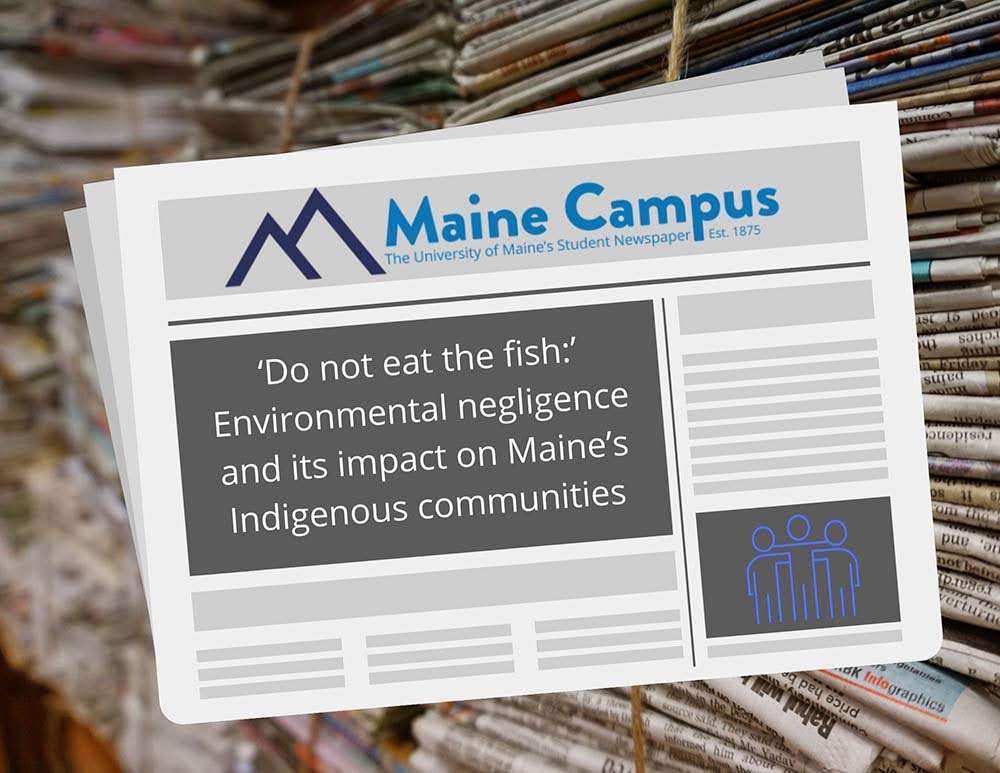In October of 2020, over 30,000 gallons of chemicals entered the Penobscot River through a floor drain leak at ND Paper Mill in Old Town. The chemicals continued to leach into the river for nearly a week raising the pH to 12 and creating an environmental disaster.
Unfortunately, this is just one example of the environmental impacts created by Maine’s industries. While companies like these may receive initial backlash, Maine’s Indigenous population is left to face the repercussions long after media attention passes.
For thousands of years, Indigenous peoples have inhabited this land and depended on Maine’s natural resources, especially the numerous rivers and lakes. The four major Native American tribes, referred to collectively as the Wabanaki, are the Passamaquoddy, Penobscot, Micmac and Maliseet. The Penobscot Nation’s headquarters is located on Indian Island, slightly down river from where the Stillwater and Penobscot river initially separate.
“The Penobscot River defines the identity, spirituality and livelihood of the Penobscot Nation. They use the river’s resources to create baskets, pottery, birch bark canoes, moccasins [and] medicinal plant gathering,” Maggie McKeon from Colorado College wrote.
The environmental threats posed today seriously jeopardize not only the health, but the cultural and spiritual practices of Maine’s Indigenous people.
“Do not eat the fish” reads a sign placed before the Penobscot River in Old Town. This alludes to the risks associated with consuming fish from the river. The Agency for Toxic Substances and Disease (ATSDR) reports numerous health risks including risk of developing liver cancer, a weakened immune system, risk to children and fetuses from methylmercury exposure, risk of pregnancy complications and developmental problems for newborns due to dioxins present in the water.
“Eating 5 to 10 ounces of anadromous fish daily could increase cancer risk and cause harmful non-cancer health effects such as a decrease in their immune system” the ATSDR found. “They contain dioxin levels which could cause harmful effects, including a significantly increased risk of liver cancer.” Additionally, the shad roe, blueback herring, striped bass, and sea lamprey are all deemed inedible due to excessive perfluorooctane sulfonic acid concentrations. The drinking water in Old Town is equally problematic.
The Environmental Working Group reports that Old Town drinking water contains 16 contaminants, 10 of which exceed their safety guidelines. Some include 111 times the safe amount of Bromodichloromethane, 57 times the amount for Chloroform, 129 times the amount of Haloacetic acids and 311 times the amount of trihalomethanes—all of which are potential carcinogens. The government has failed to regulate the safety of our water, let alone condemn the environmental culprits.
The Environment America Research and Policy Center created a 2018 report entitled “Troubled Waters: Industrial Pollution Still Threatens American Waterways,” which extensively describes the environmental impact of America’s industries. In Maine, they report multiple climate polluters including Bucksport Mill LLC and MFGR LLC. Bucksport Mill exceeded their pH, total suspended solids and Zinc limits they can put into the Penobscot River. Additionally, the MFGR violated the biochemical oxygen demand (BOD).
An excess BOD is a measure of oxygen needed for aerobic bacteria to decompose organic matter or waste. “To comply with BOD limits, commercial production and manufacturing industries are required to implement a wastewater pretreatment or disposal program,” Cristina Tuser reported for the Water and Wastes Digest. These are issues that have solutions, but no one is being held accountable.
These statistics are beyond alarming, and they have serious implications not only for Indigenous peoples but for all inhabitants in Maine. Even on a smaller scale, here in Penobscot County the water is unsafe to swim in, the fish are inedible and the drinking water is contaminated. Maine has failed to protect the water essential to Indigenous livelihood, and action is needed to reverse the damages accumulated over hundreds of years of environmental negligence.
Words of sympathy mean nothing when Indigenous people are being poisoned by their water and robbed of their basic human rights by the government. Action is needed immediately to reverse these unsafe conditions and attain environmental and social justice. All Maine inhabitants must advocate for the future of this land and the rights and health of those who inhabited it thousands of years prior.









